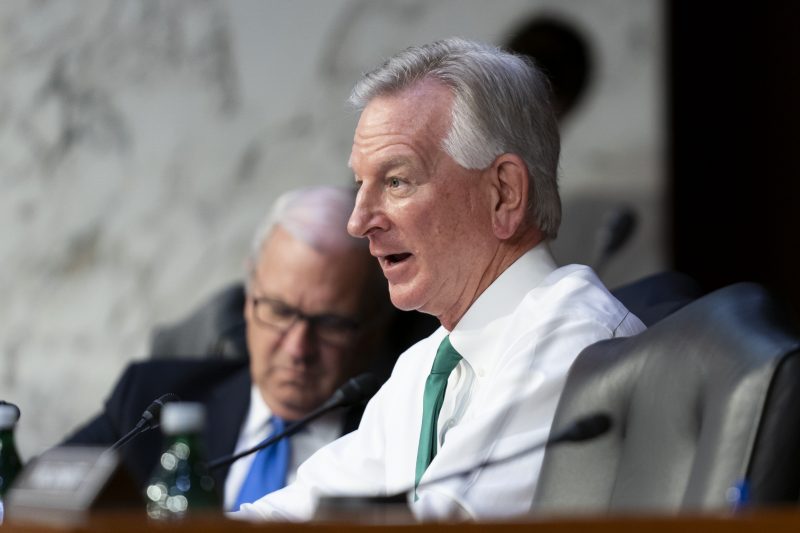President Biden is sharply escalating his criticism of Alabama Sen. Tommy Tuberville, highlighting his blockade of military nominations and using him to criticize other right-wing Republicans he characterizes as extreme, obstructionist and willing to jeopardize the country’s national security.
Biden, who has often cited Republicans outside the congressional leadership as emblematic of what he calls their party’s radicalism, warned in harsher tones and with more specificity this week that Tuberville is undermining the servicemen and women who are putting their lives at risk.
“Something dangerous is happening,” Biden said Thursday night, speaking at the Truman Civil Rights Symposium. “The Republican Party used to always support the military, but today, they are undermining the military. The senior senator from Alabama, who claims to support our troops, is now blocking more than 300 military [nominations] with his extreme political agenda.”
For months, Tuberville has refused to let the Senate approve any senior military nominations by unanimous consent unless the Defense Department changes its policy of providing travel expenses for service women seeking an abortion. The policy is a backdoor way for the Pentagon to facilitate even late-term abortions, Tuberville argues, saying last week on the Senate floor that “anyone who calls themselves pro-life needs to stand up and be counted right now.”
Biden, arguing that Tuberville is holding America’s military readiness hostage to an ideological agenda, has targeted Tuberville with growing frequency in recent weeks, mentioning him at fundraisers and in economic addresses and tweets. He often highlights the impact of Tuberville’s blockade in general terms, but on Thursday night got more specific.
The president noted that Gen. Charles Q. Brown Jr., an F-16 pilot and the first African American to lead any branch of the Armed Services, will become the next chairman of the Joint Chiefs of Staff if Tuberville lifts his hold. Adm. Lisa Franchetti, the second woman in the Navy to achieve the rank of four-star admiral, would make history as the first woman as chief of naval operations.
“Tens of thousands of America’s daughters and sons are deployed around the world tonight keeping us safe from immense national security challenges. But the senator from Alabama is not,” Biden said. “For the first time in more than 100 years, we don’t have a sitting confirmed commandant of the Marine Corps.”
Tuberville’s blockade, he said, is harming military readiness and troop morale, while disrupting the lives of hundreds of top personnel who do not know if their promotions will go through and if they will need to move their families. Biden decried “a growing cascade of damage and disruption, all because of one senator from Alabama — and 48 Republicans who refuse to stand up to him to lift the blockade.”
Tuberville has argued in the past that the Pentagon caused the problem by deciding to make its own law on abortion, liberally funding service women’s ability to get the procedure while imposing few limitations. And Steven Stafford, communications director for Tuberville, said that the attacks from Biden only serve to boost the senator in his home state, where Biden lost to Trump by 25 points in 2020.
“Joe Biden is the least popular president since Jimmy Carter,” Stafford said. “He is in no position to attack anyone.”
Tuberville’s hold has taken on increasing significance in the military, where the promotions of more than 250 generals and admirals are currently on hold. If Tuberville does not release his hold, the number of stalled military promotions is expected to rise to more than 650 by the end of the year as additional officers are identified for elevation but are unable to step into new jobs because of the blockade.
Defense Secretary Lloyd Austin cast the hold this month as a readiness issue that “creates friction throughout the entire chain” and “disadvantages families,” including children whose transfer to new school districts may be affected. “I would imagine our adversaries would look at something like this and be pretty happy that we create this kind of turbulence within our force,” Austin said.
Among the institutions directly affected are the Marine Corps, whose top officer, Gen. David Berger, retired this month. Biden has nominated Gen. Eric Smith, the Corps’ assistant commandant, to take the top job, but Smith is for now serving in an acting capacity, effectively doing his current and prospective jobs at the same time.
The Marines have not operated without a confirmed commandant in more than 100 years, Austin noted at a ceremony this month marking Berger’s departure. “Smooth and timely transitions of confirmed leadership are central to the defense of the United States, and to the full strength of the most powerful fighting force in history,” Austin said.
The Army, Navy and Air Force are all expected to face similar predicaments in coming weeks unless Tuberville relents or reaches a deal with the White House. Gen. Randy George, the vice chief of staff of the Army, is expected to take over his service on an acting basis next week, with Franchetti and Gen. David Allvin nominated by Biden to lead the Navy and Air Force, respectively, beginning this fall.
Asked about Tuberville’s hold during his confirmation hearing this month, Brown, who is in line to chair the Joint Chiefs of Staff, avoided attacking the senator directly, but he warned that the standoff jeopardizes morale and could result in some service members returning to civilian life rather than dealing with the uncertainty.
“We will lose talent because of those challenges,” Brown said. “The spouse network is alive and well, and the spouses will compare notes. The member may want to serve, but the spouses and the family get a huge vote.”
There is little indication the standoff will end anytime soon. Tuberville on Friday sent a letter to Austin with questions about the abortion policies, requesting answers by Sept. 1. “Since the policy’s implementation and despite my numerous requests, the DOD has refused to provide basic information on the utilization of this policy,” he wrote.
Tuberville has found himself in the midst of other controversies as well. Earlier this month, he appeared to be advocating for white nationalists to serve in the military, denying they were racist and characterizing them on CNN as people with “a few probably different beliefs.” He later retracted that statement.
Democrats have hammered Tuberville with increasing ferocity, accusing him of betraying America’s military, subjecting service members to undue hardship and putting the country’s security at risk. Some of his colleagues have sought to convince Tuberville to allow an up-or-down vote on changing the Pentagon’s policy, but he would probably lose such a vote, and has refused to go along.
Tuberville is taking advantage of a senator’s right to object to any presidential nomination, which forces the chamber to hold a drawn-out confirmation procedure that can take several hours. Each military nomination receives a total of three hours of debate on the floor and, with hundreds of nominations pending, that would tie up the Senate for weeks or months.
“Yes, every senator has enormous power,” Sen. Brian Schatz (D-Hawaii) said on the Senate floor earlier this week. “I could probably block the defense bill this week if I wanted to. But I won’t. And you know why? Because I’m not a maniac.”
Following Thursday’s passage of the National Defense Authorization Act (NDAA), which governs U.S. defense policy, Sen. Mike Lee (R-Utah) took to the floor to defend Tuberville, calling Democratic-led attacks on the Alabama senator “defamatory” and “downright misleading.”
“These attacks against Sen. Tuberville have been relentless … all because he’s chosen to take a stand,” Lee said, calling Tuberville’s blockade a legitimate exercise of senatorial authority.
Lee said that Tuberville had given Austin fair warning that “there will be consequences” if the Defense Department continued to reimburse travel expenses for service members to obtain abortions, and he cast Tuberville’s subsequent follow-through as a reasonable result.
The Biden-Tuberville clash is only one example of cultural battles now seeping into the national security arena, which in the past had been notably bipartisan. The House version of the NDAA includes provisions to roll back Pentagon policies on abortion access and gender-affirming care, for example, teeing up a clash with the Senate, whose version does not include those measures.
Lee and other Republicans contend it is the Biden administration that is being “extreme” by unilaterally deciding to cover the costs of women who travel to obtain abortions. The Pentagon’s policy is “a temper tantrum” reacting to the Supreme Court ruling decision overturning abortion rights, Lee said.
Biden ran for president on a promise of bipartisanship, and early in his tenure especially he limited his harsh rhetoric about the GOP as he courted a handful of Republicans to help enact his agenda. But he has also periodically focused on individual Republicans as emblematic of the extreme views he sees within the GOP, often making a point of distinguishing them from Senate Minority Leader Mitch McConnell (R-Ky.) and others he sees as honorable adversaries.
Last year, Biden’s target was often either Sen. Rick Scott (R-Fla.) or Ron Johnson (R-Wis.). He regularly cited their proposals that he argued would jeopardize programs like Social Security and Medicare.
This year, Biden has held up Rep. Marjorie Taylor Greene (R-Ga.) as an example of “extreme MAGA” Republicans, highlighting her shout of “Liar!” at him during the State of the Union address. “This is not your father’s Republican Party,” Biden often says.
But as of late, Tuberville has become the go-to antagonist for Biden. His criticisms are largely rooted in the senator’s blockade of military nominations, but they also extend to Tuberville’s reluctance to denounce white nationalists and his position on Biden’s economic legislation.
In an economic speech in Chicago in June, the president made the sign of a cross as he described how Tuberville had voted against a Biden-backed bill but then boasted about an Alabama project that the bill funded.
During a news conference in Helsinki earlier this month, he called the senator’s position on military holds “ridiculous.” On another occasion, Biden referred to him as “a former coach of a winning football team” or, less charitably, as “the former football coach from Alabama, who was a better coach than he’s a senator.”
“What Senator Tuberville is doing is not only wrong — it is dangerous,” he said in a statement.
The White House has even distributed memos on Tuberville’s positions, and the senator’s name comes up frequently during White House press briefings.
In another era, Biden might have prided himself on being able to work with a senator like Tuberville. During his 36-year career in the senate, Biden often boasted of being able to do business with senators from the South, at times remarking on how Delaware had some similarities with their states.
“I’d be willing to talk to him if I thought there was any possibility of him changing this ridiculous position he has. He’s jeopardizing U.S. security by what he’s doing,” Biden said in Helsinki. “I don’t ever recall that happening, ever. … I mean, I’m confident that the mainstream Republican Party no longer — does not support what he’s doing. But they’ve got to stand up and be counted. That’s how it ends.”
Leigh Ann Caldwell contributed to this report.








